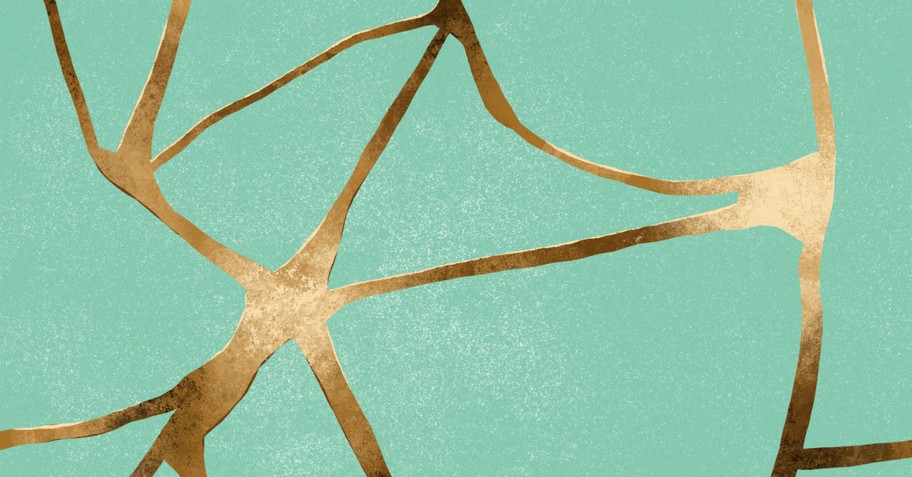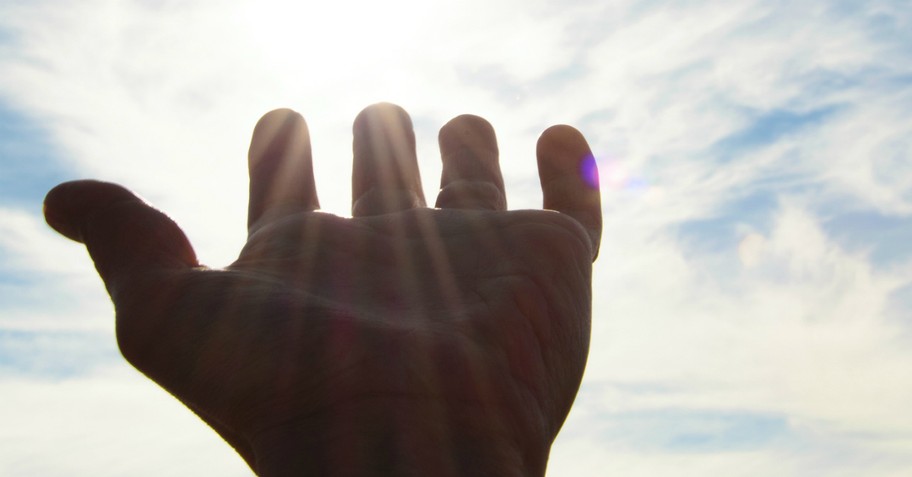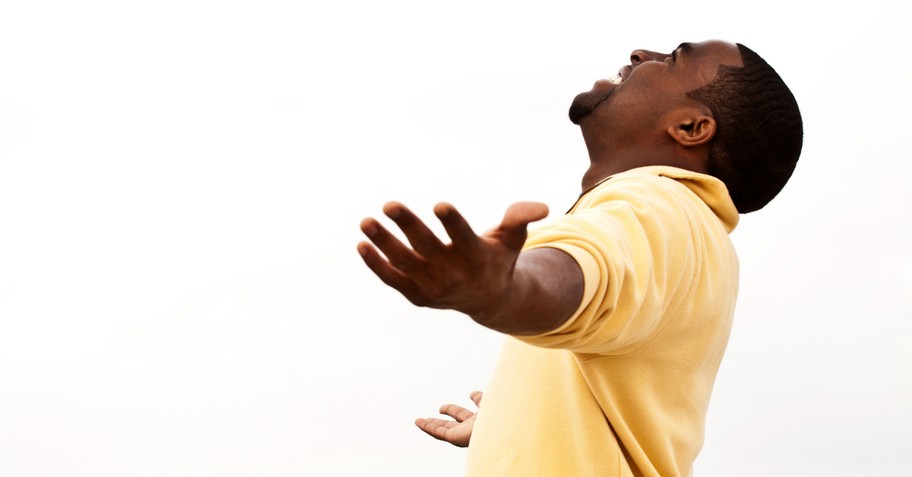There’s this question doctors ask if you’ve been injured: “On a scale of one to 10, one meaning manageable and 10 the toughest pain you’ve ever encountered, how would you rate your pain?”
I’ve been asked this dozens of times. When I was in labor with my kids, when I wrapped my Suburban around an electrical pole, after several surgeries, and, thankfully, from a counselor when she noticed the deep, jagged white lines on my arms.
I thought I had dealt with the pain of my past, until life bumped into my scars that marked me as one of the walking wounded.
Photo Credit: ©GettyImages/StockPhotosArt

Why Do We Hide Our Scars?
Interesting thing about scars: no one understands what you went through, because we’ve been taught by our culture that it’s not okay to invite someone into the mess. We think that no one should be burdened by the story or our residual pain. We’re taught it’s not okay to share the truth of our scars.
We find out early in life that it isn’t ‘pleasant’, or permissible, to be barefaced. Or to reveal a painful truth. It isn’t permissible to be vulnerable. Or to talk about our secrets and scars.
Instead, we dress up the spine of our stories, hiding the scars. Or, we perfect our covers, learning say what is acceptable, “I’m fine, how are you?”
Somewhere along the way we’ve lost the ability to say, “This is my story.” Somewhere along the way, we’ve lost the ability to share our scars. When we do say something, our culture has been taught to respond with:
“You probably shouldn’t share that.”
“That’s pretty heavy; I doubt anyone else will get it.”
“That was all in your mind and you’re better now.”
“You shouldn’t dwell on your past.”
“You shouldn’t talk about that.
“It wasn’t as bad as you thought.”
“Stop feeling sorry for yourself.”
“God doesn’t give you more than you can handle.”
These statements are the root of the problem. The enemy wants us to remain in our shame. Satan wants us to stay trapped because then our scars, our stories, our words can’t tell about who Jesus is.
Photo Credit: ©GettyImages/stockfour

Being Thankful for Scars
I’m thankful for my scars because without them I wouldn’t know Jesus’ heart or who He is. When we share our scars, we break open the jail cells of our brothers and sisters and set them free.
What used to be my shame became my story to share with women all over the nation. The self-inflicted wounds on my arms are bone deep. The angry jagged lines on my arms are a reminder of how God set me free from the pain of the past, the shame I felt, and how God kept me alive when I attempted suicide.
Between writing and speaking, my scars became the platform where Jesus can move in the hearts of others. When I see my scars, I don't think of the pain. I think of the grace of God. The scar means the wound has healed, the pain is over, and I’m moving forward.
Photo Credit: ©GettyImages/ijeab

The Art of Embracing Your Scars
It reminds me of a Japanese art form known as Kintsugi. This entails a piece of broke pottery being made whole. Instead of using clear glue, it is repaired with gold or silver. The gold or silver is placed in the cracks of the broken pottery and in some cases, whole pieces are replaced with one of the two.
This technique embraces the imperfection or flaw. It is what God does with our imperfections, scars, or flaws because those scars tell our stories. As with the gold enhancing the pottery, our scars enhance us. It shows others we have been broken and put back together.
So when a friend began treading water, and sinking into depression, I didn’t tell her any of those ‘get over it’ platitudes. I chose the opposite. I stood with her at church when the blade of her pain was searing hot and I asked her what someone once asked me, “On a scale of one to 10, how would you rate your pain—one, manageable; 10, the worst pain you’ve ever experienced.”
Her tears soaked my shoulders when she whispered, “I think it’s at an eight, maybe nine.” And then I repeated the words to her what someone wisely once said me, “You’re a fighter. You can face this. You could’ve said ‘10’ but you didn’t.”
And then I did what the culture taught us not to do. I shared my Jesus story. I shared the truth about the scars on my arms to the scars on my heart. Every single one of us is suffering in our own way and being open about such deep personal topics brings about a real emotional human connection, showing that we are all the same.
Photo Credit: ©GettyImages/Julia Gorbach

The Scars We Carry Are God’s Glory
Here’s the mind-blowing reason for your scars: the scars we carry are God’s Glory. These scars become the bridge to freedom. The moments of our desperation and despair are His jewels. When we share our stories, we trade scars for beauty marks.
Scars mark us as real people, with real lives, with real problems. It reveals just how human we are, and how a piece of Jesus’ scars are the powerhouse in every heart.
Jesus didn’t become precious because of his perfect life—he became precious because of his scars. Nailed, whipped, battered, stabbed, the son of a teenage mom, not accepted by his family, beaten and crowned with the thorns of our sins, he became God’s reckoning so we could become whole.
His scars? His disciples recognized him after he revealed the scars on his side, hands, and feet. Jesus revealed his wounds so we could fully live.
Photo Credit: ©GettyImages/Alikaj2582

Vulnerability Is True and Courageous
Brené Brown reminds us, “Vulnerability sounds like truth and feels like courage. Truth and courage aren’t always comfortable, but they’re never weakness.” She defines vulnerability as, “emotional risk, exposure, uncertainty,” and states it is “our most accurate measurement of courage. Vulnerability is the birthplace of innovation, creativity, and change.”
Vulnerability, among all the emotions, is the one that is most often mistaken for weakness. In reality, however, the opposite is true; vulnerability is courage in its greatest form. Without a shadow of a doubt, allowing yourself to be vulnerable and admitting that you are vulnerable is downright scary.
Vulnerability isn’t your enemy, nor is pain or the truth. It reminds you that you’re human, that you’re alive. Those scars give rich meaning to life experiences. Pain also happens to be a sounding bell signaling something is not right. In my experience, pain forces us to places such as churches, hospitals, or in the arms of friends or a counselor’s office so healing can begin.
Without pain, there wouldn’t be an indication of healing to be made whole. And if you’re that person who went to places like church, hospitals, and counselors for help but found a solid door, try the next one and the next one.
It’s brave to share your scars. It’s life-giving to share because every one of us is engaged in the battle of living. Our lives were created to share in God’s story and to build his kingdom. What your past inflicted cannot be undone. But you will always have a choice. You can choose to hide your scars, or you can choose to be vulnerable and brave, for God’s glory.
Photo Credit: ©GettyImages/digitalskillet
Originally published February 11, 2020.








